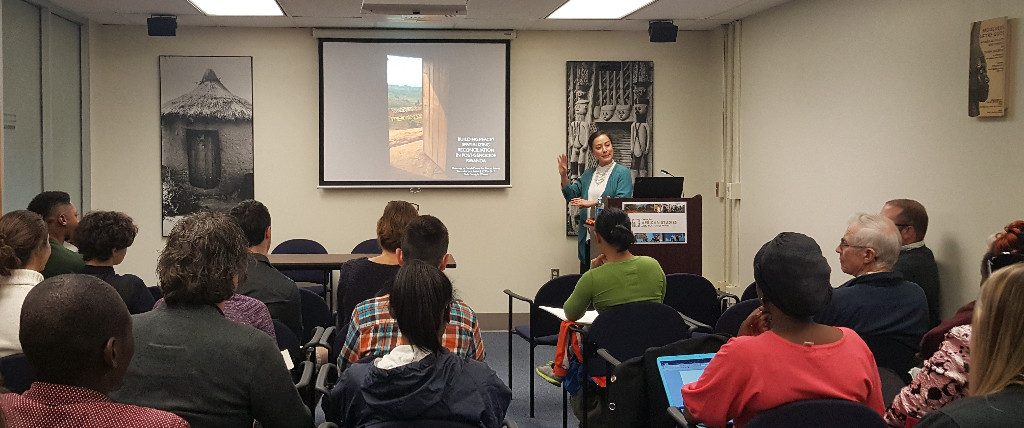 On Friday March 17th, Delia Wendel gave a Baraza presentation titled “Building Peace? Spatializing Reconciliation in Post-Genocide Rwanda”. Dr. Wendel is an interdisciplinary scholar and design practitioner, currently working as lecturer of urban planning and design at the Harvard University Graduate School of Design. The talk focused on the role spatial and structural, public and private, conceptions of reconciliation and development are used to pursue peacebuilding efforts in post-genocide Rwanda.
On Friday March 17th, Delia Wendel gave a Baraza presentation titled “Building Peace? Spatializing Reconciliation in Post-Genocide Rwanda”. Dr. Wendel is an interdisciplinary scholar and design practitioner, currently working as lecturer of urban planning and design at the Harvard University Graduate School of Design. The talk focused on the role spatial and structural, public and private, conceptions of reconciliation and development are used to pursue peacebuilding efforts in post-genocide Rwanda.
Wendel argues that conceptions of material and social space are necessary to understand the context of peacebuilding in post-genocide Rwanda. Harking on themes of state-controlled reconciliation and development under an authoritarian Rwandan state, Wendel questions who is considered vulnerable and in need of government help. Put differently, who bears the cost of peace? Through two years of multi-method statistical, anthropological, geographical, and personal research in Rwanda, Wendel’s dynamic processes bring her to the fictional spaces which work to shape imagined communities after conflict, partially through state-controlled public performances of reconciliation. Similarly, categories determining who is deserving of government help are regulated, such that even being the relative of a genocide perpetrators or survivor is a determining aspect of one’s status. Three overlapping jurisdictions, Wendel argues, produce and subvert processes of reconciliation in Rwanda: government, architecture, and religion. These jurisdictions highlight the nature of public and private space, and the degree of state control over both domains. But though the government tries to regulate citizen behaviors and co-opt individuals into admitting to participating in the genocide (while regulating what reconciliation is and how it is performed), the state is unable to manage residents’ persistent resentments or individual-level reconciliation. Finally, Wendel relates this to another aspect of state-building, fomenting peace through (standardizing) development, in which residents again have no voice in the determinations of these processes.